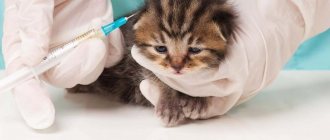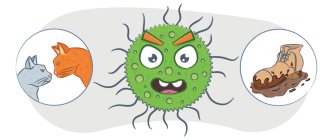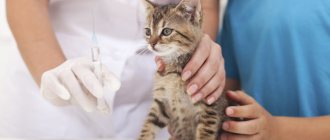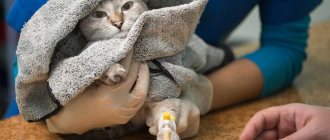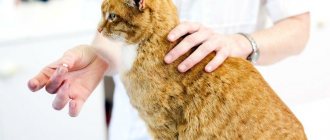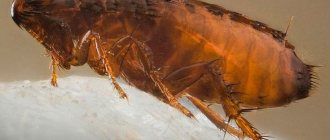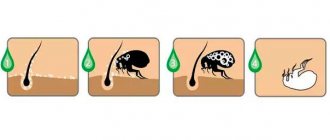Unfortunately, kittens often die due to various diseases, and the main reason for this is the lack of vaccinations. After all, vaccination is an opportunity to avoid contracting a viral or microbial infection.
That is why it will be useful for every owner to learn how to prepare for vaccination, which drug to choose, and how to cope with possible complications.
Do cats need vaccinations?
The answer is clear - it is necessary. This way the owner will protect the animal from a number of health problems. But the risk of getting a bacterial or viral infection remains.
Prejudice against vaccination:
- Domestic cats do not need to be vaccinated;
- outbred animals have strong immunity;
- kittens from the nursery do not need vaccinations;
- A purebred cat does not need vaccination if it does not participate in competitions and exhibitions.
The mistaken position of pet owners is not to vaccinate their kitten because it lives at home and does not go outside. They forget that harmful microorganisms can enter the apartment on shoes and outerwear.
Expert opinion
Chepa Natalya Semenovna
Veterinarian
Ask an expert
How else can a domestic cat become infected with a dangerous infection? For example, an animal fell out of a window or ran out of an apartment. Often such a cat can spend several days outside or in the basement before its owner finds it, this is enough time for infection. The likelihood of coming into contact with a sick animal is also high when visiting a veterinary clinic. Please note that your veterinarian has the right to refuse to accept a cat that has not been vaccinated against rabies. By law, owners are required to vaccinate their pets against rabies annually, regardless of their living conditions.
The second myth is that street kittens have strong immunity, their body will successfully fight off any infection. In fact, outdoor cats are even more susceptible to attack by viruses or bacteria. No one is giving them vaccines. Kittens become infected in the womb or after birth through their mother's milk.
Important! The lifespan of outdoor cats and cats is 50–70% less than indoor cats. They are susceptible to attacks from stray dogs and irresponsible people, get poisoned after preventative treatment of basements by housing and communal services, and die from infections due to lack of vaccination.
A cat from a cattery may not be vaccinated. It is important to check how honestly the organization’s employees do their job of caring for the animals and whether they take care of the kitten’s first vaccination. If he was given to a family without a veterinary passport, this is the first sign of dishonesty among the nursery workers.
Important! The veterinary passport serves as the only proof of vaccination of the animal. The document must have the appropriate stamps and the dates of vaccinations given.
The vaccination schedule is the same for everyone. First, the required complex vaccine is selected. Then an appointment with the doctor is scheduled and the vaccine is given. After 3 weeks, revaccination is done to consolidate the result and improve the body’s adaptation.
This is true for both purebred and outbred animals. Persian kittens receive the same vaccinations as regular street kittens.
Mandatory training
Do you still naively believe that a cat living in an apartment is not able to harbor helminths inside itself? Yes, not only kittens picked up on the street will have to be wormed, but all mustaches, even if they were taken from a sterile nest. Every day the owners walk down the street, and they wear the same shoes when they enter the apartment. A curious kitten will immediately run to sniff the shoes, on the soles of which worm eggs are almost always found.
Once in the cat's body, helminths weaken it and disable many organs and systems. Immunity declines, there are not enough antibodies. And if such a kitten is injected with a vaccine, it can kill it. Therefore, remember a vital rule: before vaccination, the kitten must undergo deworming. And not the only one!
By deworming a kitten, you will only destroy the adults, while their eggs and larvae will remain in the body. And after 10 days they will turn into adult worms, but will not yet have time to lay new eggs. Therefore, you need to have time to destroy these young animals by repeating deworming. And only after that, on the 8th (maximum 10th) day, you can vaccinate.
The following drugs have proven themselves to be the best:
- Kanikvantel (can be used from 3 weeks of life);
- Febtal (from 3 weeks);
- Profender in drops (from the age of 5 weeks);
- Milbemax (from 6 weeks);
- Anthelmintics – drugs in drops/tablets/injections.
Without what vaccinations will a cat not be allowed abroad?
Owners will not be allowed to transport a cat across state borders without mandatory vaccinations:
- from rabies;
- viral leukemia;
- panleukopenia;
- viral nature of immunodeficiency;
- rhinotracheitis;
- calcivirosis;
- infectious peritonitis;
- mycosis.
A kitten and any other animal must have an initial rabies vaccination one month before departure on a trip.
Important! The disease called “panleukopenia” has a popular name – “distemper”.
Vaccine prices
In different parts of the country, the cost of vaccination can vary significantly, despite the fact that identical drugs are used. Veterinary clinics will also offer you different price options, but here it depends on the prestige of the institution. In the capital, as a rule, vaccination will cost the owner more than in a simple provincial town.
The best solution is to call all organizations and compare their offers with each other. This way you can find the most economical option.
When not to vaccinate
According to the unified veterinary protocol, the first vaccination is canceled if at least one factor from the list is present:
- chronic, acute or subacute disease;
- high temperature - more than 39.2°C degrees;
- exhaustion;
- dehydration;
- suspected immunodeficiency or confirmed diagnosis;
- the animal is less than 8 weeks old;
- recent injection of hyperimmune serum - less than 3 weeks ago;
- helminthiasis or infection with other parasites;
- lack of preliminary deworming;
- recent surgery – less than 2–3 months.
Domestic cats are not vaccinated if they are pregnant. The period of estrus begins at approximately 6–7 months. For some, earlier – from the 5th month. The first vaccination does not affect the health of the kitten if the animal is in heat or on a cat spree. As for the period of change of baby teeth, veterinarians have a mixed opinion.
Important! The main reason for doctors’ refusal to carry out primary vaccination on schedule is the weakened immunity of cats.
When do kittens get their first vaccination?
Kittens are first vaccinated at the age of 2–3 months. If the babies were fed exclusively with mother's milk, and the cat itself is relatively healthy, you can start vaccinating a month later.
Kittens are vaccinated in 2 stages:
- a set of serums against various diseases (without rabies);
- after 21 days with anti-rabies serum (against rabies and other infections).
The immunity program begins to develop completely independently from the 2-3rd month. Until this time, the protection that babies received from mother's milk will remain in effect. Veterinarians call it “colostral (passive) immunity.”
Important! Rabies vaccinations can be done no earlier than 3 months (12 weeks).
What can happen if you don't get vaccinated at 2 months?
Why do you need to get vaccinated? To understand the seriousness of the situation, we will provide a list of diseases that can affect both the still fragile body of a 2-month-old kitten and an adult.
- Rhinotracheitis . An infectious disease that occurs in an acute form and first manifests itself through damage to the eyes and organs of the respiratory system. A pet of any breed can get sick, be it a “nobleman” or a British one.
- Calicivirus . A viral, infectious disease that occurs, like the previous one, in an acute form. It affects the mucous membranes of the oral cavity and the respiratory system, causing ulcers. All this is accompanied by a feverish state.
- Panleukopenia . A terrible viral disease. It is almost impossible to survive when infected. The respiratory organs, heart, and gastrointestinal tract are affected. The course of the disease progresses with symptoms such as vomiting, nausea, fever, and loose stools.
- Chlamydia . An infection that infects body cells using bacteria. The bacterium kills the immune system of cells and continues to infect the body through reproduction. It is also worth noting that a sick animal can infect humans!
- Rabies . An infectious disease that is caused by a virus. The disease is highly contagious and spreads through a bite. The infection is found in the saliva and on the teeth of the affected pet. Transmitted to humans! An infected animal cannot be treated.
© shutterstock
We hope that the above list is a sufficient reason for the kitten to be vaccinated at 2 months.
Vaccination table for cats by age
Vaccination table for cats under 1 year of age:
| Diseases | Kitten age, weeks | ||
| Primary vaccination | Revaccination through: | Routine vaccination | |
| Calcivirosis Panleukopenia Rhinotracheitis | 8–12 | 2–4 | 1 time per year |
| Chlamydia | 9–12 | 2–4 | 1 time per year |
| Trichophytosis, microsporia (ringworm). | 8–12 | 10 | 1 time per year |
| Rabies | 8–12 | – | Once every 3 years |
| Infectious peritonitis | 16 | 20 | 1 time per year |
The vaccination protocol allows for the addition of another vaccination for preventive purposes - against chlamydia. Duration: 2 weeks after the main procedure. In subsequent years, rabies vaccinations should be given only if the animal goes outside.
What to pay attention to after vaccination
Often, vaccination does not cause any harm to the cat's body. But within 2-3 days the pet may seem lethargic, eat little and sleep a lot. This is a normal reaction that should not cause concern to the owner.
There are a number of points that you need to pay attention to after injection of the vaccine:
- Lack of appetite. If this condition continues for more than 2 days from the moment the vaccine was administered, then this is a signal to contact a veterinarian.
- Vomiting and loose stools. You must immediately contact a specialist. This reaction indicates infection of the body.
- Anaphylactic shock. Very rare, but it happens. This may be an individual reaction to the components of the drug. This condition usually develops within 15–20 minutes after administration of the drug. It is recommended not to rush home after vaccination, but to spend this time in the clinic. If after 20 minutes everything is fine with the animal, then you can no longer expect the development of anaphylactic shock and can safely go home.
- Swelling at the injection site. Typically this reaction goes away within 15 days. If swelling lasts longer, you should visit a doctor. It can develop into sarcoma, which is very dangerous for the pet’s health.
- Allergy. It can manifest as itching, redness of the skin and rashes around the lips, on the neck, and around the eyes. Some allergic manifestations may include vomiting, diarrhea, difficulty breathing, and fainting. This will require professional care. Self-treatment is not allowed.
- Slight increase in temperature. This is the norm. The cat may suffer from aching joints, which will manifest itself through lameness. When vaccinated against chlamydia, fever is possible.
Any symptoms should not last more than 2 days. Otherwise, this is a signal that something went wrong. In this case, you should immediately consult a doctor.
Which vaccines to choose
List of vaccines for cats and kittens:
- Purevax.
- Nobivak.
- Multifrel.
- Leucorifelin.
- Quadricate.
- Fort Dodge Fel-o-Wax IV.
- Rabizin.
- Felocel.
- Leucocel.
- Microderm.
- Felovax.
Today, the first 2 vaccines on the list are considered universal, effective and extremely safe. In second place are Felovax and Multifrel.
Table of vaccine characteristics using Nobivak as an example:
| Name | Diseases | Kitten age |
| Nobivak Forcat (multicomponent) | Calcivirosis Rhinotracheitis Panleukopenia Chlamydia | from 8 weeks |
| Nobivac Tricat (triple protection of immunity against viruses) | Calcivirosis Rhinotracheitis Panleukopenia | 8–12 weeks |
| Nobivac Rabies | Rabies | 12 weeks |
Important! Nobivak Rabies can be mixed with other Nobivak vaccines.
How to prepare a cat for vaccinations
Step-by-step scheme for preparing cats for vaccination:
- Eliminating fleas - they are carriers of helminths. The animal bites the flea, swallows the microscopic eggs of the parasite and becomes infected.
- Deworming 1–2 weeks before the procedure.
- Examination on the day of the procedure - the doctor measures the temperature, checks the oral cavity and conjunctiva of the eyes for the presence or absence of inflammation.
Note! If before scheduled vaccination the cat had contact with an infected animal, vaccination is postponed for 14 days.
Care after vaccination
Rules for caring for a kitten after vaccination:
- Protect the animal from stress, drafts, and injuries.
- Do not bathe for 3–4 days.
- Do not overload with active games for several days.
- Do not overfeed.
Important! After a preventive or routine vaccination, you should not leave the clinic immediately. You need to wait 15 minutes. During this time, the doctor will observe the animal. If there is no acute allergic reaction, you can go home.
How many vaccinations are given against polio?
The Russian national vaccination calendar provides the following polio vaccination schedule:
· in the 1st year of life – at 3,4,5 and 6 months;
· in the 2nd year of life – at 18 and 20 months;
· at the age of 14 – once.
In accordance with the Russian calendar, the first two vaccinations are carried out with IPV, the third – with OPV. The vaccination course involves the use of only inactivated vaccines. When two doses of OPV are administered, it is possible to provide high local protection in the intestine. With continued use of live vaccines, the risk of developing vaccine-associated poliomyelitis is reduced.
Possible complications after vaccination
In most cases of cat immunization, no serious side effects are reported after vaccination. Usually the entire period of antibody production proceeds without problems. But doctors emphasize that everything is individual.
After routine vaccination, cats may experience:
- lethargy;
- loss of appetite;
- anxiety;
- infrequent sneezing;
- swelling at the injection site;
- anxiety;
- drowsiness;
- fever;
- slight increase in temperature;
- allergic reactions;
- inflammation of the subcutaneous cellular structure (removed only surgically).
Note! Since January 2021, all veterinarians have been following a single protocol - before the procedure, they notify cat owners about changes to the vaccination regulations. Now the vaccine is placed not in the withers, but in the muscle of the hind leg. This precaution allows us to exclude the development of malignant neoplasms in the lungs (sarcoma), which over the past 2–3 years have often been recorded precisely after vaccination at the withers.
